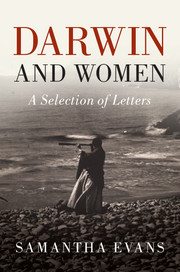Book contents
- Frontmatter
- Contents
- List of illustrations
- Foreword
- Preface
- Acknowledgments
- Symbols, abbreviations, and conventions
- 1 Friends
- 2 Marriage
- 3 Children
- 4 Scientific wives and allies
- 5 Observing plants
- 6 Companion animals
- 7 Insects and angels
- 8 Observing humans
- 9 Editors
- 10 Writers and critics
- 11 Religion
- 12 Travellers
- 13 Servants and governesses
- 14 Ascent of woman
- List of letters and provenances
- Biographical notes
- Bibliography and further reading
- Index
13 - Servants and governesses
Published online by Cambridge University Press: 16 February 2017
- Frontmatter
- Contents
- List of illustrations
- Foreword
- Preface
- Acknowledgments
- Symbols, abbreviations, and conventions
- 1 Friends
- 2 Marriage
- 3 Children
- 4 Scientific wives and allies
- 5 Observing plants
- 6 Companion animals
- 7 Insects and angels
- 8 Observing humans
- 9 Editors
- 10 Writers and critics
- 11 Religion
- 12 Travellers
- 13 Servants and governesses
- 14 Ascent of woman
- List of letters and provenances
- Biographical notes
- Bibliography and further reading
- Index
Summary
Servants were a vital part of middle-class Victorian life. Female servants and governesses were part of the great army of women earning their own living. According to Harriet Martineau, writing in 1864, more than two million English women were self-supporting workers (Martineau 1864, p. 554.) When reading Darwin's remarks about how women could not be men's intellectual equals until they were generally breadwinners, it's useful to remember how many female breadwinners were living in his own household. Little correspondence survives between Darwin and his servants, and most is of a strictly businesslike nature. The Darwins were reportedly kind to their staff, who as a result stayed longer than they might have in other households. Emma and the children maintained relationships with some servants long after they had left the family, and where letters from the servants do survive, they tend to have been sent to Emma and the children. From these and letters to and from Darwin himself that mention servants, it is possible to get a clearer idea of their lives.
When the children were tiny, Emma had nurses to help her, the best loved one being Jessie Brodie. Before joining the Darwins, Brodie had been nurse to the children of William Makepeace and Isabella Thackeray. Brodie left Down after Annie's death in 1851, overcome by grief. Darwin paid her an annuity of £5. She retired to Portsoy, Scotland, near her birthplace. She visited the Thackerays and Down regularly until her death in 1873, and kept in touch by letter. She wrote the following letter to Henrietta after Henrietta's marriage to Richard Buckley Litchfield in 1871.
3 Banermill St [Aberdeen]
22 Nov
My ever dear Mrs Lichfield
Think how happy I was when I got your very kind letter with that beautifull adress to Mr Lichfeld it is just what his apperance is in his Cards, where it is Relley Sumthing to be admired it Shall be quit a treasur to me to look at & admire it. it was so very kind of you my owen sweet pet to send it I Cannot Describe how much I estame it. it is more than I Could have Expected of you to have sent it I haup you will Geat a Comfortable House
- Type
- Chapter
- Information
- Darwin and WomenA Selection of Letters, pp. 194 - 209Publisher: Cambridge University PressPrint publication year: 2017

